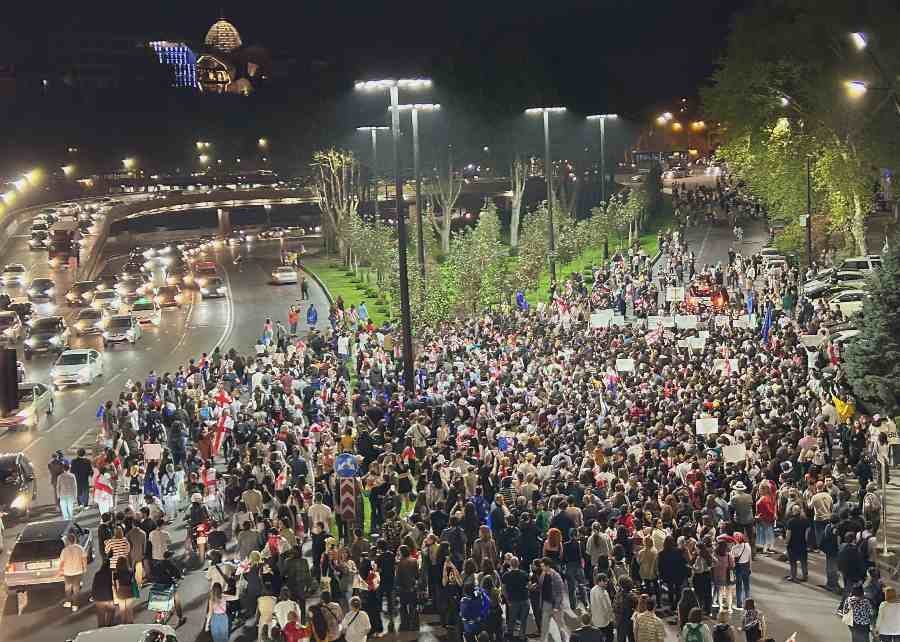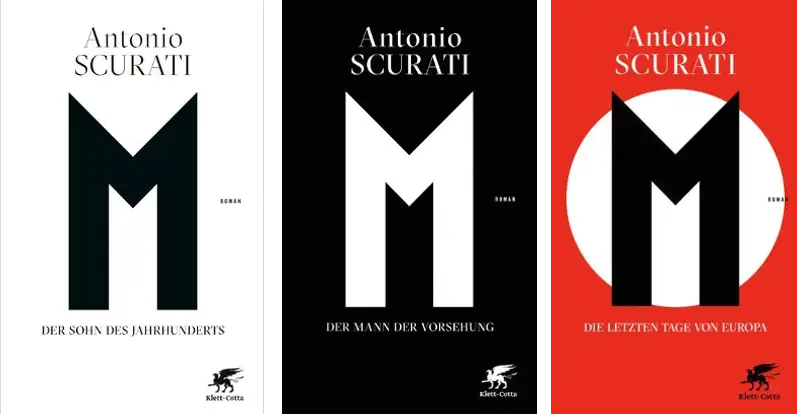Forget the great rallies of January and February in the German squares, suddenly awakened from their torpor and aware of what is at stake should the extreme right take over the country.
Forget the ongoing mobilisation of Israelis who, for more than a year and now, after recovering from the terrible shock of October 7 and in the midst of the longest war their country has ever fought, are united - along with the families of the hostages - in fighting for the soul of their country, for its democracy, for its humanity.
In Italy, very little goes out on the streets, and very little for collective causes that go beyond the interests of a single category. Don't be fooled by the pleasures you can experience as a tourist: Italy is a tired country, exhausted by unresolved crises and unresolved problems. Italy is a disillusioned country, more committed to surviving in the present than to planning, or at least dreaming, about the future. Less than 64% of Italians took part in the 2022 general elections: the lowest figure in the history of the Republic. In regional and local elections, 40-50% is already a lot.
Italy has something to celebrate this week: or does it?
And yet something happened in Italy last weekend: and whether it was a flash in the pan or a real reason to get out and mobilise en masse, we will find out in a few days' time, on Thursday 25 April.
So, what is the 25 April and why is an important date? In Italy we call it our Liberation Day, "Festa della Liberazione".
It's a national holiday commemorating the end of the Nazi occupation and the fall of Benito Mussolini's fascist regime in 1945. On this day, Italian institutions pay tribute to the resistance movement known as the "Partisans" (also known worldwide for their hymn "Bella Ciao"), who fought alongside the Allied forces to liberate the Country.
After liberation, Italy went through a period of transition to establish a new form of government. The monarchy was abolished on 2 June 1946, paving the way for a republic. A Constituent Assembly then drafted the new Italian Republican Constitution, which was ratified on 22 December 1947 and came into force on 1 January 1948, one year before the German Federal Constitution of 1949. The Italian constitution is not only republican: it is explicitly an anti-fascist Chart.
Last weekend, in a country governed by a centre-right coalition led by Giorgia Meloni, public television was preparing programmes to celebrate the event. Among those invited to give a monologue was Antonio Scurati, an academic and writer who rose to international fame with a monumental trilogy on Benito Mussolini and Italian Fascism.
Scurati's monologue on 25 April, blocked by Italian state television: failed censorship and a media boomerang for Italy´s government.
Italian author Alessandro Scurati had prepared a four-minute monologue for a minor news program on state television. The monologue explored the history of Fascism in Italy, culminating in a commentary on Giorgia Meloni, leader of the right-wing Brothers of Italy party.
State TV officials, reportedly close to the Meloni government, blocked Scurati's participation. Initially, they cited "excessive costs" (around 1,800 euros), but later explanations remained unclear. The content of the monologue itself likely triggered the ban. It traced the origins of Fascism in Italy, drawing a connection to the present day (Herein in the Italian version read on RAI TV by journalist Serena Bortone last Saturday)
Following the cancellation, the monologue went viral. The program's presenter, along with many actors, intellectuals, and ordinary citizens, recited the piece over the past two days. This transformed a paid monologue into a freely distributed viral phenomenon.
The monologue is simple: it recounts and explains the beginnings of Fascism, which lost all democratic appearance in 1924 with the assassination of Mussolini's main opponent, the socialist Giacomo Matteotti.
From 1924, Scurati jumps to the other topical moment, the two years 1944-45, during which the Nazi massacres and the liberation of the peninsula took place, culminating on 25 April 1945, the date of the liberation of Milan.
The final minute is an indictment: of a government that, according to Scurati, seeks to rewrite history, condemning only the worst that happened with the Nazis and not the rest. The author's bitter conclusion:
"As I speak to you, we are once again on the eve of the anniversary of the liberation from Nazi fascism. The word (anti-fascism) that the Prime Minister refused to pronounce will still sound on the lips of all sincere democrats, be they of the left, centre or right. As long as that word - Antifascism - is not spoken by those who govern us, the spectre of fascism will continue to haunt the house of Italian democracy.
Beyond performative anti-fascism: reclaiming Italy's Liberation Day.
Years away from Italy, watching the "fascist vs. anti-fascist" debate from afar seems pointless to me. Here in Berlin, the endless battles over slogans, tattoos and words to be banned exhaust me too.
What really counts are the ideas, the actions, the underlying trends. There are reasons why frustrated or frightened people indulge in far-right ideas. Understanding those reasons is more important than pretending to hear declarations of adherence to the democratic order.
Italy's obsession with public declarations of "anti-fascism" has become a rhetorical ritual. It's a smoke screen masking a lack of concrete proposals, alternative visions and inspiring leadership.
Why is 25 April, which was supposed to unite the nation, more divisive than ever?
It's not just about a resurgence of fascist nostalgia. For decades, I've watched as 25 April has become a stage for political parties and fringe groups to fight over ownership, hijack the day for unrelated causes and rewrite history to suit their agendas.
The now defunct Communist Party once claimed almost sole ownership, reluctantly allowing Catholic groups a marginal presence. With their disappearance, the broader left took control, excluding non-leftists such as liberals.
More recently, protests and expulsions have targeted members of the Jewish Brigade - soldiers from British Mandate Palestine who fought to liberate Italy. Their memory was vilified as 'Zionist' and 'close to fascism'. Meanwhile, Palestinian flags and anti-Western chants became strangely common at these events:
NOT-WITH-NATO-NOR-WITH-RUSSIA
ANTIFASCIST ALWAYS: SIONIST NEVER
Confusion leads to apathy. How can we rally around a distorted memory weaponised for personal agendas? How can we march alongside those who denounce the very nations who liberated us alongside the resistance?
Four minutes. That's all it took for a powerful "j'accuse" to ignite a viral fire across Italy, with echoes likely to reach across Europe and beyond.
Will this lead to a better 25 April?
One marked by larger participation and a deeper understanding of the meaning of the day? Or will the Italian flag be overshadowed by a confusing patchwork of irrelevant symbols and rainbow flags?
Let's be clear: pacifism alone would not have saved us from fascism. Under a Peace Flag, we might still be living under a Fascist or Francoist regime today.
For Italy, I hope for a more meaningful 25 April. Great expectations may be unrealistic, but democracy walks on the legs of committed citizens who actively defend their democracies. We see this in the year-long impressive demonstrations in Israel, in the struggle for democracy in Budapest and in the inspiring unity of Georgian and European flags waving in the streets of Tbilisi. These movements remind us that a Europe free of Fascism, Nazism and Communism remains our common destiny, a promise worth fighting for.

P.S. 25 April is also Portugal's National Freedom Day, commemorating the 1974 revolution that began Portugal's transition to democracy and culminated in the country's first free elections the following year. It is also known as the Revolução dos Cravos.
HERE THE ORIGINAL TEXT IN ITALIAN, PLUS THE ENGLISH AND GERMAN VERSIONS.
🇮🇹 Giacomo Matteotti fu assassinato da sicari fascisti il 10 di giugno del 1924.
Lo attesero sottocasa in cinque, tutti squadristi venuti da Milano, professionisti della violenza assoldati dai più stretti collaboratori di Benito Mussolini.
L'onorevole Matteotti, il segretario del Partito Socialista Unitario, l'ultimo che in Parlamento ancora si opponeva a viso aperto alla dittatura fascista, fu sequestrato in pieno centro di Roma, in pieno giorno, alla luce del sole. Si batté fino all'ultimo, come lottato aveva per tutta la vita. Lo pugnalarono a morte, poi ne scempiarono il cadavere. Lo piegarono su se stesso per poterlo ficcare dentro una fossa scavata malamente con una lima da fabbro. Mussolini fu immediatamente informato.
Oltre che del delitto, si macchiò dell'infamia di giurare alla vedova che avrebbe fatto tutto il possibile per riportarle il marito. Mentre giurava, il Duce del fascismo teneva i documenti insanguinati della vittima nel cassetto della sua scrivania. In questa nostra falsa primavera, però, non si commemora soltanto l'omicidio politico di Matteotti; si commemorano anche le stragi nazifasciste perpetrate dalle SS tedesche, con la complicità e la collaborazione dei fascisti italiani, nel 1944. Fosse Ardeatine, Sant'Anna di Stazzema, Marzabotto. Sono soltanto alcuni dei luoghi nei quali i demoniaci alleati di Mussolini massacrarono a sangue freddo migliaia di inermi civili italiani.
Tra di essi centinaia di bambini e perfino di infanti. Molti furono addirittura arsi vivi, alcuni decapitati".
Queste due concomitanti ricorrenze luttuose - primavera del '24, primavera del '44 - proclamano che il fascismo è stato lungo tutta la sua esistenza storica - non soltanto alla fine o occasionalmente - un irredimibile fenomeno di sistematica violenza politica omicida e stragista. Lo riconosceranno, una buona volta, gli eredi di quella storia?
Tutto, purtroppo, lascia pensare che non sarà così. Il gruppo dirigente post-fascista, vinte le elezioni nell'ottobre del 2022, aveva davanti a sé due strade: ripudiare il suo passato neo-fascista oppure cercare di riscrivere la storia. Ha indubbiamente imboccato la seconda via.
Dopo aver evitato l'argomento in campagna elettorale la Presidente del Consiglio, quando costretta ad affrontarlo dagli anniversari storici, si è pervicacemente attenuta alla linea ideologica della sua cultura neofascista di provenienza: ha preso le distanze dalle efferatezze indifendibili perpetrate dal regime (la persecuzione degli ebrei) senza mai ripudiare nel suo insieme l'esperienza fascista, ha scaricato sui soli nazisti le stragi compiute con la complicità dei fascisti repubblichini, infine ha disconosciuto il ruolo fondamentale della Resistenza nella rinascita italiana (fino al punto di non nominare mai la parola "antifascismo" in occasione del 25 aprile 2023).
Mentre vi parlo, siamo di nuovo alla vigilia dell'anniversario della Liberazione dal nazifascismo. La parola che la Presidente del Consiglio si rifiutò di pronunciare palpiterà ancora sulle labbra riconoscenti di tutti i sinceri democratici, siano essi di sinistra, di centro o di destra. Finché quella parola - antifascismo - non sarà pronunciata da chi ci governa, lo spettro del fascismo continuerà a infestare la casa della democrazia italiana".
Antonio Scurati, April 2024
🇮🇹 Giacomo Matteotti was assassinated on 10 June 1924 by Fascist hitmen.
Five of them, all Milanese squaddies, professionals of violence hired by Benito Mussolini's closest collaborators, waited for him in front of his house. The Honourable Matteotti, secretary of the United Socialist Party, the last person in Parliament still openly opposing the fascist dictatorship, was kidnapped in the centre of Rome, in broad daylight. He fought to the last, as he had fought all his life. They stabbed him and dismembered his body. They folded his body in order to throw it into a pit that had been badly dug with a blacksmith's blade.
Mussolini was informed immediately. In addition to the crime, he was guilty of the infamy of having sworn to the widow that he would do everything possible to get her husband back. While swearing, the Duce of Fascism kept the victim's bloody papers in his desk drawer.
In this false spring, however, we are not only commemorating the political murder of Matteotti, but also the Nazi-fascist massacres perpetrated by the German SS in 1944, with the complicity and collaboration of the Italian fascists.
Fosse Ardeatine, Sant'Anna di Stazzema, Marzabotto.
These are just some of the places where Mussolini's demonic allies cold-bloodedly massacred thousands of defenceless Italian civilians. Among them were hundreds of children and even babies. Many were even burned alive, some beheaded". "These two mournful anniversaries - Spring of '24, Spring of '44 - proclaim that Fascism was an unredeemable phenomenon of systematic murderous and massacring political violence throughout its historical existence, not only at the end or occasionally.
Will the heirs of that history finally acknowledge this? Unfortunately, everything suggests that they will not. The post-fascist ruling group, which won the elections in October 2022, had two options available to them: repudiate their neo-fascist past or try to rewrite history.
It has undoubtedly chosen the second path. Having avoided the issue during the election campaign, the Prime Minister, when forced to deal with it by historical anniversaries, has persistently stuck to the ideological line of her neo-fascist culture of origin: She has distanced herself from the most indefensible atrocities committed by the regime (the persecution of the Jews) without ever repudiating the fascist experience as a whole, she has blamed the massacres committed with the complicity of the Fascist Republicans on the Nazis alone, and finally she has denied the fundamental role of the Resistance in the Italian rebirth (to the point of never mentioning the word "anti-fascism" on the occasion of 25 April 2023).
As I speak, we are once again on the eve of the anniversary of the liberation from Nazi fascism. The word that the Prime Minister refused to pronounce will still sound on the thankful lips of all sincere democrats, be they of left, centre or right. As long as this word - anti-fascism - is not spoken by those who govern us, the spectre of fascism will continue to haunt the house of Italian democracy.
Antonio Scurati, April 2024
🇩🇪 Giacomo Matteotti wurde am 10. Juni 1924 von faschistischen Killern ermordet.
Fünf von ihnen, allesamt Schwadroneure aus Mailand, Profis der Gewalt, die von Benito Mussolinis engsten Mitarbeitern angeheuert wurden, warteten vor seinem Haus auf ihn. Der Abgeordnete Matteotti, Sekretär der Vereinigten Sozialistischen Partei, der letzte Abgeordnete, der sich noch offen gegen die faschistische Diktatur stellte, wurde am helllichten Tag im Zentrum von Rom entführt. Er kämpfte bis zum Schluss, wie er sein ganzes Leben lang gekämpft hatte. Sie erstachen ihn und zerstückeln dann seine Leiche. Sie falteten ihn zusammen, um ihn in eine Grube zu schieben, die mit einer Schmiedefeile ausgehoben worden war.
Mussolini wurde sofort informiert. Zusätzlich zu diesem Verbrechen machte er sich der Schande schuldig, der Witwe geschworen zu haben, alles zu tun, um ihren Mann zurückzuholen. Während er schwor, bewahrte der Duce des Faschismus die blutigen Papiere des Opfers in seiner Schreibtischschublade auf.
In diesem falschen Frühling gedenken wir jedoch nicht nur des politischen Mordes an Matteotti, sondern auch der nazifaschistischen Massaker, die 1944 von der deutschen SS unter Mitwirkung und Kollaboration der italienischen Faschisten verübt wurden.
Fosse Ardeatine, Sant'Anna di Stazzema, Marzabotto.
Diese sind nur einige der Orte, an denen Mussolinis dämonische Verbündete kaltblütig Tausende von wehrlosen italienischen Zivilisten massakrierten. Unter ihnen befanden sich Hunderte von Kindern und sogar Säuglinge. Viele wurden sogar lebendig verbrannt, einige enthauptet".
Diese beiden gleichzeitigen traurigen Jahrestage - Frühjahr '24, Frühjahr '44 - verkünden, dass der Faschismus während seiner gesamten historischen Existenz - nicht nur am Ende oder gelegentlich - ein unauslöschliches Phänomen systematischer mörderischer und massakrierender politischer Gewalt war. Werden die Erben dieser Geschichte dies endlich einmal anerkennen?
Alles deutet leider darauf hin, dass sie es nicht tun werden. Die postfaschistische Regierungsgruppe hatte nach ihrem Wahlsieg im Oktober 2022 zwei Wege vor sich: ihre neofaschistische Vergangenheit zu leugnen oder zu versuchen, die Geschichte neu zu schreiben.
Er hat sich zweifelsohne für den zweiten Weg entschieden. Nachdem sie das Thema im Wahlkampf vermieden hatte, hat die Premierministerin, als sie durch historische Jahrestage gezwungen war, sich damit zu befassen, stur an der ideologischen Linie ihrer neofaschistischen Ursprungskultur festgehalten:
Sie hat sich von den unentschuldbaren abscheulichen Grausamkeiten des Regimes (der Judenverfolgung) distanziert, ohne jemals die faschistische Erfahrung als Ganzes zu leugnen, sie hat die Massaker, die mit der Komplizenschaft der faschistischen Republikaner verübt wurden, allein den Nazis angelastet, und schließlich hat sie die grundlegende Rolle des Widerstands bei der Wiedergeburt Italiens geleugnet (bis zu dem Punkt, dass sie das Wort "Antifaschismus" anlässlich des 25. April 2023 nie erwähnt hat).
Während ich spreche, stehen wir wieder am Vorabend des Jahrestages der Befreiung vom Nazifaschismus. Das Wort, das der Premierminister sich weigerte auszusprechen, wird immer noch auf den dankbaren Lippen aller aufrichtigen Demokraten klingen, ob sie nun der Linken, der Mitte oder der Rechten angehören. Solange dieses Wort - Antifaschismus - von denen, die uns regieren, nicht ausgesprochen wird, wird das Gespenst des Faschismus weiterhin das Haus der italienischen Demokratie heimsuchen".
Antonio Scurati, April 2024


















Share this post